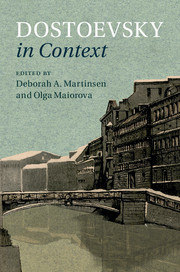Book contents
- Frontmatter
- Contents
- List of illustrations
- Notes on contributors
- Acknowledgments
- Note on citation, transliteration, glossary, and dates
- Chronology
- 1 Introduction: the many worlds of Dostoevsky
- PART I SOCIAL, HISTORICAL, AND CULTURAL CONTEXTS
- PART II LITERATURE, JOURNALISM, AND LANGUAGES
- 25 Modern print culture
- 26 Realism
- 27 Dostoevsky: translator and translated
- 28 Travel and travel writing
- 29 Folklore
- 30 Foreign languages
- 31 Theater
- 32 Dostoevsky's journalism and fiction
- 33 Dostoevsky's journalism in the 1860s
- 34 Dostoevsky's journalism in the 1870s
- 35 Censorship
- Glossary
- Further reading
- Index
- References
30 - Foreign languages
from PART II - LITERATURE, JOURNALISM, AND LANGUAGES
Published online by Cambridge University Press: 18 December 2015
- Frontmatter
- Contents
- List of illustrations
- Notes on contributors
- Acknowledgments
- Note on citation, transliteration, glossary, and dates
- Chronology
- 1 Introduction: the many worlds of Dostoevsky
- PART I SOCIAL, HISTORICAL, AND CULTURAL CONTEXTS
- PART II LITERATURE, JOURNALISM, AND LANGUAGES
- 25 Modern print culture
- 26 Realism
- 27 Dostoevsky: translator and translated
- 28 Travel and travel writing
- 29 Folklore
- 30 Foreign languages
- 31 Theater
- 32 Dostoevsky's journalism and fiction
- 33 Dostoevsky's journalism in the 1860s
- 34 Dostoevsky's journalism in the 1870s
- 35 Censorship
- Glossary
- Further reading
- Index
- References
Summary
Among the many characters we encounter in Dostoevsky's novels, some catch our attention because they speak in a foreign language. Almost all his novels feature either an arrogant Russian nobleman or intellectual wannabe who seasons his speech with French proverbs or a German character, often a doctor or a landlady, who mixes German into his or her fractured Russian. Short exclamations or longer utterances in French or German abound. By interspersing his Russian text with other languages, Dostoevsky mirrors the multicultural character of St. Petersburg, marks such speakers as either resident aliens or Russians alienated from the Russian soil, and reflects the particular history of the literary language in Russia.
Since the Russian literary language developed later than the written vernaculars of Western Europe, the coexistence of different languages for different purposes was typical for Russian culture, as was mixing different languages and styles in written documents. With the Christianization of Rus’ around the year 1000, the first written language was introduced to the culture. It was called “Old Church Slavonic” and was written in an alphabet based on Greek. The Russian alphabet today is a modern version of these early letters. Just as Latin did in Western Europe, Old Church Slavonic served as the language of church, government, and education. It was universally understood in Slavic lands and comprehensible but strange to Russian speakers, who used it for elevated cultural functions, especially in written form. And, while the Russian vernacular developed over time, the rigidly codified rules and vocabulary of Old Church Slavonic remained static.
During the Renaissance, as European societies secularized, national literary languages developed and soon served all functions that needed written expression. Unlike Europe, however, Russia had no Renaissance, and a secular national literary language did not develop until the early eighteenth century, when Peter the Great's project of modernizing Russia's government, military, and infrastructure needed a language that could communicate and record new developments. The Russian vernacular was cultivated as a written language for administrative and accounting purposes, and Old Church Slavonic was used only for ecclesiastical purposes. Since the Russian language lacked an equivalent for many new concepts and even objects, the deficit was usually filled either with a direct translation (a calque) or the foreign word was adapted into the Russian lexicon without translation.
- Type
- Chapter
- Information
- Dostoevsky in Context , pp. 258 - 263Publisher: Cambridge University PressPrint publication year: 2016



